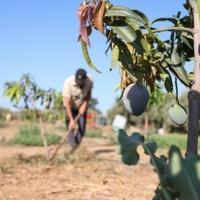Stirring the leaves of a shrub on his farm in Kyparissia, western Greece, Panos Adamopoulos noticed the first mangoes ripening — a result of a state experiment to combat climate change.
“Right there!” he exclaimed.
Historically known for olives, watermelon, and other crops, this fertile land by the Ionian Sea in Greece is now facing the impacts of drought despite receiving more rainfall than other regions.
Greece recently experienced its warmest winter on record, followed by the hottest June and July since reliable data collection began in 1960.
“There is no winter,” Adamopoulos, 38, told AFP, mentioning the absence of rain on his property since March.
Most of Adamopoulos’ current income comes from iceberg lettuce, yet as dry seasons become more common, he may need to give up water-intensive crops like watermelon.
Adamopoulos is one of the few Greek farmers turning to tropical fruits like mangoes, avocados, lychees, cherimoya, and macadamia nuts, which he believes are better suited to the region’s increasingly intense heat.
Currently, he only has a few dozen mango and avocado trees on his 80-hectare estate, planning to expand with 300 more trees and expecting his first harvests later this month.
The initiative is part of a study by the Greek state agriculture institute Demeter to assess the viability of tropical fruits in addressing future drought issues.
– Not a miracle solution –
Study supervisor Teresa Tzatzani aims to find innovative ways to adapt to climate change and utilize it beneficially.
Although avocado trees already grow on Crete, the adaptation of mango trees to the Greek mainland is uncertain due to recent dry winters.
This innovative approach is crucial for the agricultural sector to mitigate the impact of climate disasters, emphasized Antonis Paraskevopoulos, head of agriculture for the local region of Triphylia.
While tropical fruits are not intended to replace staple products like olives or oranges, they can serve as supplements, with plans to extend the experiment to other Greek regions, says Tzatzani.
Similar challenges are being faced in neighboring countries like Italy, where Sicilian farmers are turning to tropical fruits due to climate change predictions by the Intergovernmental Panel on Climate Change (IPCC).
– A ‘bad year’? –
Farmer Theodoros Dimitrakakis believes it will take years for tropical fruit production to become profitable in Greece despite his enthusiasm for the experiment, as he must prioritize his main income source, olive trees.
Like many in Greece, Dimitrakakis faces water shortages due to scheduled cuts, impacting last year’s olive yield, which was well below average.
Realizing the imminent impact of climate change, Dimitrakakis now aims to convince other local farmers, some of whom attribute difficulties to a temporary setback.
led/yap/jph/ju/rl





